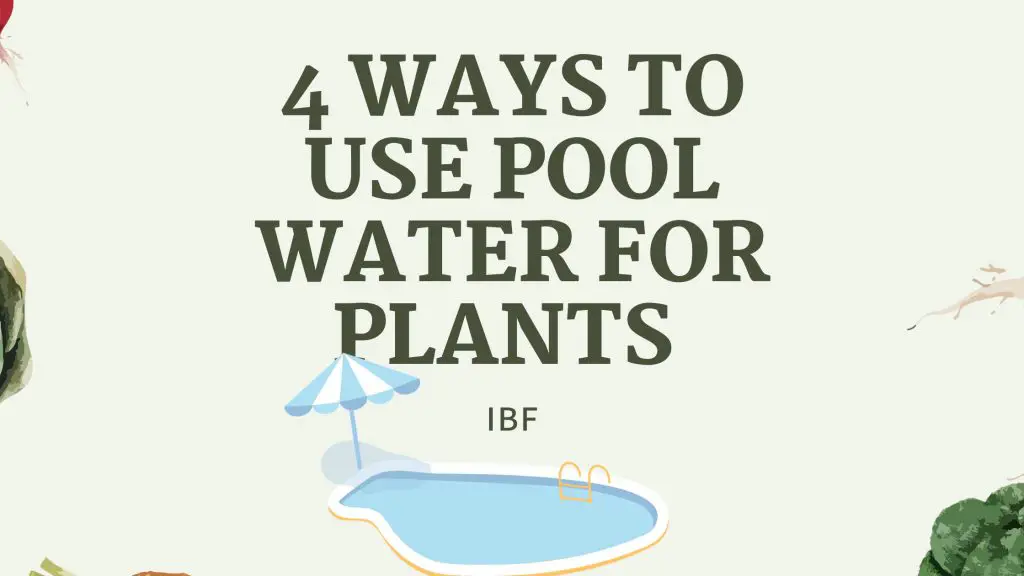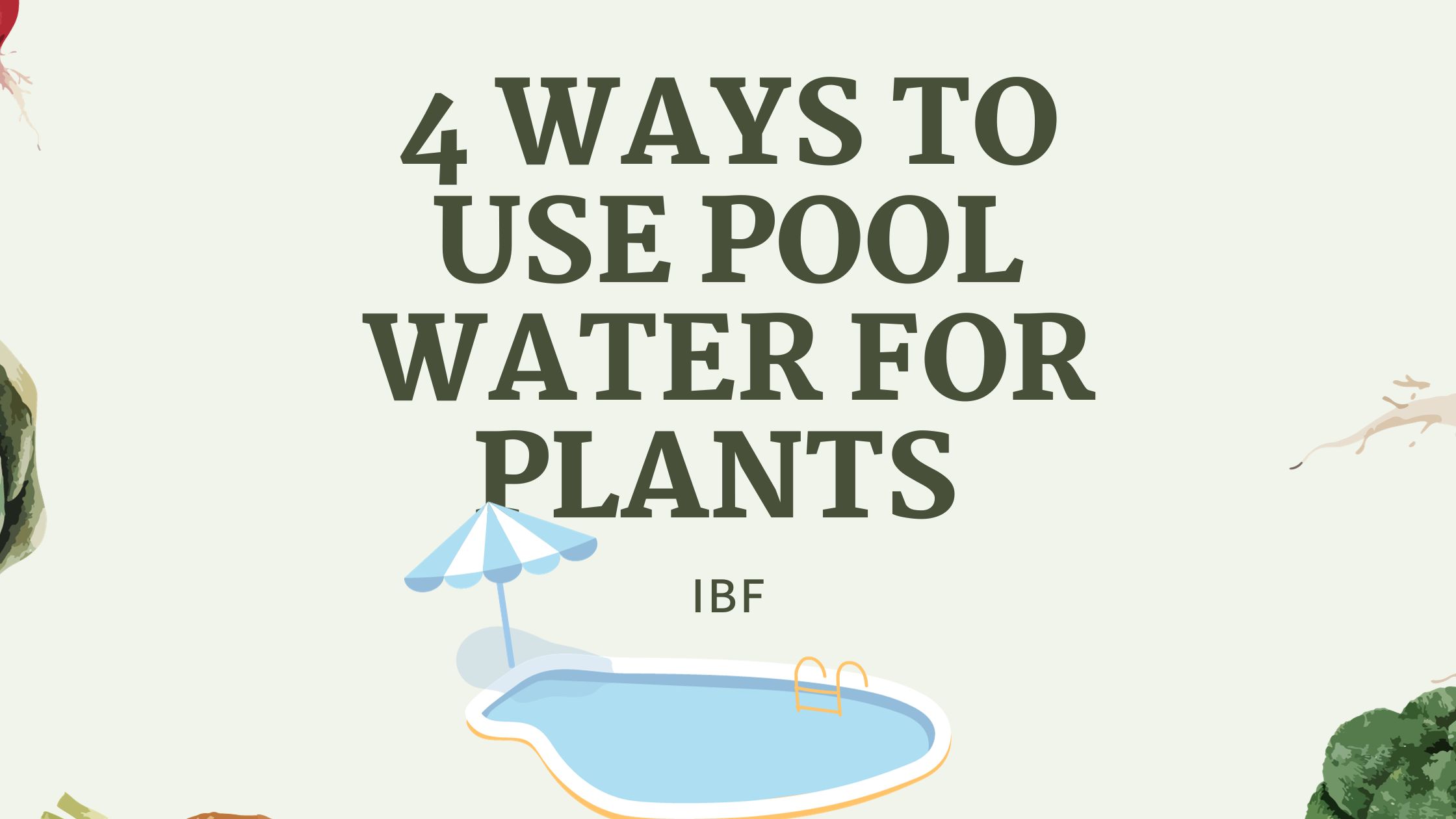Pool water contains chlorine and other chemicals that can be harmful to plants, so it is important to dechlorinate the water before using it to irrigate. Chlorine can burn plant roots and leaves, while other chemicals can alter the soil pH and make it difficult for plants to absorb nutrients.
Is pool water safe for plants and grass? In most cases, very little to no harm will occur to the lawn when a pool, hot tub, or other chlorinated water source is emptied on it, provided it is not done often, dumped all in one spot, and care is taken to decrease the chlorine concentration as much as possible from the usual range for a pool or hot tub.

Making the Most of Your Pool Water for Plant Care
The stuff like chlorine and other chemicals in pool water can be a real buzzkill for your plants, so let’s dive into how to make it work.
1. Dealing with Chlorine in Pool Water
Getting Rid of Chlorine
First things first, we need to get rid of that chlorine. There are a couple of ways to do this, and they’re pretty straightforward:
- Let the water chill for a bit. Leave it be for 24-48 hours, and the chlorine will naturally evaporate. Easy-peasy.
- Or, you can grab a dechlorinator. You’ll find these in the store, or you can use natural alternatives like vitamin C or sodium thiosulfate. They’re like the superhero cape for your pool water.
Will chlorinated pool water harm plants? Swimming Pool Water Harms Plants Too much chlorine can damage tree leaves and other delicate tissues. Too much chlorinated water all at once can even kill trees. It doesn’t take much chlorine for damage to occur. Some experts say the concentration threshold for tree damage can be as low as 0.5 parts per million. Don’t Kill Your Trees When Draining Your Pool – Barts Tree Service
2. When and How to Shower Your Plants with Pool Water
Perfect Timing and Technique
Now, timing is everything. Watering your plants with dechlorinated pool water is best in the early morning or evening, when the sun’s not throwing its fiery tantrums. This way, you can dodge the risk of sunburn for your leafy pals.
Oh, and here’s a tip: aim for the soil around the base of the plant, not the leaves. Plants aren’t fans of a direct pool water shower, so give them a gentle soak instead.
But, don’t go overboard – overwatering is a plant’s nightmare, causing root rot and other headaches. Just give them what they need.
Can You Freeze Carrot Juice? All Info
2 Ways To Grow Lemongrass In Cold Weather: Easy Guide
Can you put plants in chlorinated water? A: It’s a waste, but fresh pool water is not safe for irrigating plants. It’s because the chlorine in pool water is very poisonous to plants. If the chlorine level is low enough, it’s possible to use it.
3. Plants That Play Nice with Pool Water
Pool-Friendly Plant Picks
Some plants are cool with pool water, so don’t hesitate to sprinkle them with your liquid asset. Here’s a list of some pool-friendly plants:
- Flowers: Begonias, geraniums, impatiens, marigolds, petunias, and roses.
- Veggies: Beans, cucumbers, eggplants, peppers, and tomatoes.
- Trees and shrubs: Azaleas, bougainvillea, hibiscus, oleander, and roses.
What can I do with old pool water? If there isn’t a sanitary sewer connection or accessible cleanout, slowly drain water to a landscaped area on your property to allow the water to soak into the ground. Your lawn will appreciate it! If options 1 and 2 don’t work for your property, discharge the water to the City stormwater system.
4. Plants That Are Pool Water Prudes
Plants That Prefer Regular Water
But wait, not all plants are up for a pool party. These ones are a bit sensitive, so don’t shower them with pool water:
- Flowers: African violets, ferns, and orchids.
- Veggies: Carrots, lettuce, potatoes, and spinach.
- Trees and shrubs: Camellias, citrus trees, conifers, and rhododendrons.
Does pool water contaminate soil? Most people should know that undiluted chlorine can harm plants or living things due to changes in soil pH (thanks to science classes in school). On the other hand, in diluted form (or when mixed with water), chlorine is not harmful. In a nutshell, small splashes of water on your lawn will not have any effect.
Pro Tips for Watering Your Plants with Pool Water
Additional Pointers for Successful Plant Care
Here are some extra pointers to ensure your pool water plant care game is strong:
- Check the chlorine level in your pool water before pouring it on your plants. It should be below 0.5 parts per million (ppm) to be safe.
- Stay away from salty pool water – it can damage your soil and plants.
- Water your plants deeply but not too often. This helps flush out the chlorine and other chemicals from the soil.
- Keep an eye on your plants for signs of distress, like yellowing leaves or leaf burn. If you spot any red flags, switch back to regular water.
Is chlorinated pool water bad for grass? Yes. With prolonged exposure, pure chlorine will kill your grass.
In Conclusion
There you have it, folks. Pool water can be a lifeline for your plants, but treat it with care. By dechlorinating it and following the right watering guidelines, you can keep your leafy friends happy and thriving. Happy gardening!
Does chlorine help plants? Because chlorine can eliminate bacteria, in excessive amounts, it could have a negative impact on the good soil bacteria that benefit plants. Excessive chlorine can also directly harm plant roots.


